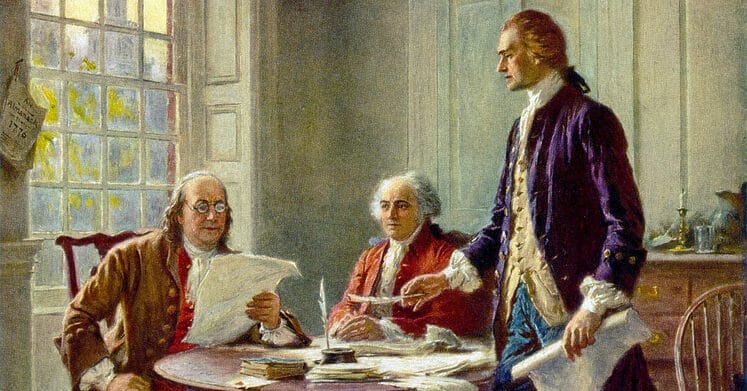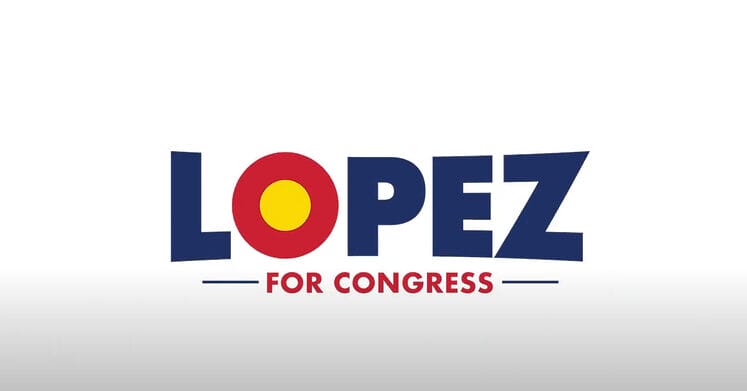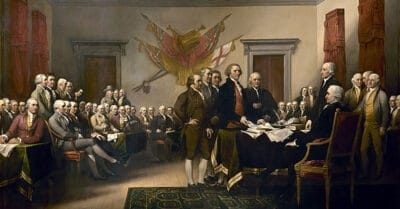Battle of Cosmologies
We are living in the turbulent wake of a cosmological revolution.
Some people may believe that the current revolution is between the cosmology of the Bible (God Created the world) and the cosmology of science (i.e. Big Bang & Evolution).
What many people do not realize is that both sides won that battle. According to a 2018 Pew research poll, the vast majority of people (>80%), whether religious or not, accept a scientific cosmology. In other words, most Americans believe both in God and in a science-based cosmology.
Parenthetically, while belief in God and science may seem like a paradox for some people, for those who define God as the creator of the cosmos, belief in God and evolution makes perfect sense since science explains the details of how God creates everything.
Today, the battle is between different scientific cosmologies.
Furthermore, the culture war in the U.S. is, at its root, a war between these different scientific cosmologies.
What is a cosmology
A cosmology is any story, whether scientific, philosophical, or religious, that offers a cohesive narrative of how the universe, life and human culture came to be and how we fit into it. Astronomers use the term cosmology in a more restricted sense to refer to the study of the physical universe.
Purpose of a cosmology
“The farther back you look,
the farther ahead you are likely to see.”
~ Winston Churchill.
The purpose of a cosmology is to help people predict what is possible in the future and to offer guidance for how to get there. Just as a useful map helps us navigate through space, a useful cosmology helps us navigate through time.
Varieties of Cosmologies
There are many different cosmologies. One example is the cosmology in the Bible recorded in Genesis.
There are also many different scientific cosmologies. They go by different names including Cosmic Evolution; the Epic of Evolution; the Journey of the Universe, or The Evolution of Everything.
Historians, inspired by science, also have various cosmologies, including Big History, The Great Story, and Evolution’s Arrow.
Different scientific cosmologies can have radically different implications for your life and our country.
This may be a surprise to you. It was to me. When I first began learning about the story of our universe, I thought there was one narrative that all scientists agreed upon. This is not the case. There are many versions of the scientific narrative. Although these different cosmologies are based on current science, they can be radically different, based on what they emphasize.
Some cosmologies are FAR MORE USEFUL because they are more predictive, inspiring, and informative.
For the sake of simplicity, I lump different cosmologies into two different groups: Pessimistic and Optimistic.
Pessimistic Cosmologies
Big History
Today’s most widely taught cosmology is called Big History. The historian David Christian coined the term Big History to describe our modern cosmology in terms that historians could appreciate. Hearing David Christian’s lectures recorded on DVD, Bill Gates declared it was the best class he had ever taken because it connected the dots between physics, chemistry, biology, psychology, and culture. Inspired by this work, Bill Gates wanted every student to learn this story, and so, he and David Christian founded the Big History Association to further develop the curriculum and support international research in Big History. Today, Big History is taught around the world in universities and high schools.
While many aspects of Big History are optimistic, some aspects are pessimistic. Although Bill Gates is a big fan of Big History, he has commented that Big History presents a more pessimistic view than he feels is warranted.
So, what exactly makes Big History pessimistic?
Big History in a Nutshell
“Entro, evo, info.
These concepts define the narrative of human progress:
the tragedy we were born into,
and our means for eking out a better existence.”
~ Steven Pinker, in Enlightenment Now
In his New York Times bestselling book Enlightenment Now: The Case for Reason, Science, Humanism, and Progress, Stephen Pinker concisely captures the essential forces driving Big History in three words: Entro, Evo, and Info. Entro is for entropy. Evo is for Evolution, and Info is about psychological information.
As Pinker tells it 1) Entropy is about the disorderly march of the universe toward ultimate heat death, 2) evolution is about life’s never-ending struggle for limited resources, and 3) info is about human’s subconscious cravings driving us toward chaos, despair and possible extinction. Info is also about the human ability to learn so to improve our situation.
While Pinker acknowledges his optimism about human’s ability to learn, his concise cosmology focuses on how the universe is decaying, how organisms struggle to exist, and how humans are greedy and tribal.
Entro•Evo•Psycho
Entro•Evo•Psycho is an example of a Pessimistic Cosmology because it focuses on how the universe is decaying on its way to heat death. To be clear, Entropy, the struggle for existence, and human greed are all very real.
Yet the Entro•Evo•Psycho cosmology overlooks a central, obvious, and essential fact: creativity. It fails to explain how anything is created. It ignores the fact that energy flow (aka the second law of thermodynamics) creates both order and disorder (i.e. Entropy). It overlooks the fact that biological evolution relies on the creation of variation. It overlooks all the ways that DNA recombines to create novelty. Natural selection, by itself, is not creative. As for human psychology, Entro•Evo•Psycho trends to overlook the fact that, in addition to being self-interested, humans can also be wonderfully compassionate, astonishingly adaptable and fabulously creative.
The problem with Entro•Evo•Psycho is that it fails to focus on how anything is actually created. It neglects how wealth is created, how innovation happens, or why freedom is essential for human flourishing.
Failing to describe how anything is created, Entro•Evo•Psycho fails to tell the most useful part of the story.
To say that life evolves by natural selection without mentioning where variation comes from is like declaring that the iPhone was made by consumer selection. This is ridiculous, because it ignores the hundreds of technological innovations made by thousands of engineers that went into designing and manufacturing the iPhone. Likewise, the diversity of life cannot be understood unless you talk about all the ways in which DNA combines and recombines in astonishingly diverse ways to yield endless forms most beautiful.
Victim Cosmology
Entro•Evo•Psycho is not just a less predictive cosmology. It also causes existential angst, despair, and hopelessness. For some people, Entro•Evo•Psycho is a cosmology of victims.
For example, Michael Dowd and Connie Barlow have been teaching “The Great Story” (a science-informed cosmology) for many years to over 3000 church and community groups. Their cosmology has led them to the conclusion that our civilization and climate are now collapsing. They and their followers are victims of an oppressive narrative. Many are depressed. To help thousands of their followers cope with despair, caused by the “already unfolding and unstoppable nature of biospheric and civilizational collapse,” Dowd and Barlow have started an organization called Postdoom.
Many other people, including followers of Yuval Harari, author of Sapiens, are victimized by their particular doomsday cosmologies.
The fear generated by a disempowering cosmology causes people to feel out of control, which in turn, makes them want to control other people and their environment. For many, this also means demanding bigger government, more control, more censorship, and more regulation.
Rationally Optimistic Cosmology
In contrast to pessimistic cosmologies are rationally optimistic cosmologies.
Growimg evidence from genetics and neurobiology has led to the emergence of cosmologies that are more predictive and also inspire awe, wonder, and gratitude. These are the cosmologies of rationally optimistic creators.
Natural laws and bottom-up forces spontaneously drive our cosmos toward the emergence of greater order, complexity, cooperation, consciousness, compassion, freedom, and even happiness.
One rationally optimistic cosmology is described by Matt Ridley in his book The Evolution of Everything. In this book, Ridley talks about how things are created in a bottom up, emergent way.
Evolution’s Arc
I have begun calling this more empowering cosmology “Evolution’s Arc” in honor of Dr. Martin Luther King who famously said, “The moral arc of the universe is long and bends toward justice.”
The core idea is that our universe has a direction (arc) toward greater order, complexity, consciousness, freedom, and innovation. This is not wishful thinking, but a set of testable hypotheses with plenty of evidence to support them.
This cosmology does not mean that terrible things do not happen. It simply means that over time, order and complexity tend to increase.
Progress
An essential feature of an optimistic cosmology is progress. Progress of the past indicates that progress in the future is possible.
In The History of the Idea of Progress author Robert Nisbet argues no idea has been more important to Western Civilization than the idea of progress. Evolution’s Arc is a cosmology of progress.
Predictive and inspiring cosmologies have enlightened, inspired, and enriched the most successful, creative, and philanthropic people to ever walk the Earth, including Epicurus, Moses, Jesus, Jefferson, Franklin, Martin Luther, Dr. King, and countless parents, artists, entrepreneurs, creators and millions more.
Creator’s Cosmology
One’s cosmology determines one’s destiny. Victims have disempowering cosmologies whereas creators have empowering cosmologies.
The most creative people throughout the ages have had predictive, inspiring, and useful cosmologies.
Some of the most creative people to have ever lived are those who created the United States of America.
The Cosmology of Thomas Jefferson
“We hold these truths to be self-evident,
that all men are created equal,
that they are endowed by their Creator with certain unalienable Rights,
that among these are Life, Liberty and the pursuit of Happiness.”
Jefferson’s immortal words in the Declaration of Independence were inspired by his rationally optimistic cosmology.
Jefferson’s cosmology, like many Deists and Enlightenment thinkers, was a fusion of two distinct cosmologies: that of Genesis and of the Greek philosopher, Epicurus.
Jefferson was influenced by the hopeful and inspiring message of Genesis 1. “God created the world, and it was good.” For Jefferson, like his contemporaries, there was little difference between Nature, God and Providence. For many people, especially in Jefferson’s day, God is synonymous with Objective Reality. More precisely, God is the creator (i.e. laws or logos) of Objective Reality.
Although he did not have the scientific details that we have, Jefferson understood that progress was possible. Although he never knew about the Big Bang or DNA or dopamine, Jefferson had a scientific cosmology that was informed by new discoveries, history, and the ancient Greek cosmology of Epicurus.
Epicurus’ philosophy and cosmology was recorded by the Roman poet Lucretius in his epic work called De Rerum Naturum (On the Nature of Things). Jefferson was so inspired by this book, that he owned five copies. Lucretius’ words “pursuit of happiness” inspired Thomas Jefferson to include this phrase in the Declaration of Independence.
On the Nature of Things influenced many Enlightenment thinkers, including Galileo, Adam Smith, Freud, Darwin, and Einstein. In a way, the message of Lucretius was the message of the Enlightenment: Emancipate yourself from authoritarian rule by studying the laws of nature (i.e. God).
During the time of Lucretius, authoritarians (in this case religious elites) used fear of death to manipulate and control people. Lucretius’ goal, like Epicurus who inspired him, was to encourage people to study the laws of nature so to be liberated from superstitious fears promoted by authoritarians. This was cosmology as liberation.
From Victim to Creator
Around 20 years ago, I had a victim’s cosmology and was afraid for the future. If you had asked me if the universe was friendly or not, I would have said “It is indifferent.” I was depressed and took antidepressants to make life bearable.
One day, a friend paraphrased Dr. Martin Luther King, Jr. and said, “The arc of the universe bends towards love.” In that one mysterious and magical moment, my cosmology changed from irrationally pessimistic to rationally optimistic. It was as if I was seeing a constellation of stars from the other side of the galaxy. Same stars, but the stars were aligned in a more hopeful constellation. I saw that the universe was friendly, in that it supported my well-being in countless ways. For example, every breath was a gift of a trillion molecules of oxygen. I felt immense gratitude for the trillions of cells in my body and the trillions of synapses that coordinated the movement of all those cells so that I could dance or sing. Amazing! That day set me on a quest to discover the evidence supporting Evolution’s Arc. It turns out, the evidence is overwhelming. By seeing the incredible creativity of the past, I know that there is so much possibility for the future. I long ago quit antidepressants and most days I feel beyond blessed to be alive. And while I have faced my share of challenges, the long bouts of soul crushing depression have been replaced with knowledge that “this too will pass.”
My life’s mission is to promote this inspiring and hopeful cosmology. I am just beginning, and am grateful to Kim Monson for her curiosity to learn more and to give me this opportunity to share this joyful story.
I have the audacious belief that a rationally optimistic cosmology, like Evolution’s Arc, could do for the next couple hundred years of our country what Jefferson’s cosmology did for the first couple hundred years.
The best is yet to come.
A culture without an empowering cosmology is a culture without a future
Today, many people are aware of the negative impact that Critical Race Theory has had on student’s morale, understanding of the world, and appreciation for American values.
Very few people are aware that victim cosmologies, like Entro•Evo•Psycho, have a similar, and perhaps even more devastating impact on student’s outlook and psyche.
It is no coincidence that victim cosmologies and Critical Race Theory both share elements of Marx’s Historical Materialism. Furthermore, it is no coincidence that both CRT and some victim cosmologies call for centralized rule and redistribution of wealth to solve society’s problems.
We can turn this around by promoting a more predictive and inspiring cosmology.
The difference between suffering and celebrating is a better cosmology
The story of the universe, life, and culture is the story of creativity. When we learn about how the world was created, we become more informed, more inspired, and more effective creators. Instead of complaining about what we do not want, we have better tools to create solutions to problems and to create paradise on Earth.
Improve your cosmology, improve your life
If you are interested in learning more about the cosmologies of creators, I invite you to check out the recently launched website, EvolutionsArc.com, where I will be posting articles and links to informative books and videos. If you are interested in discussing these ideas, I would love to connect with you at EvolutionsArc.com.
Until my book comes out, I highly recommend Matt Ridley’s books Evolution of Everything and How Innovation Works. I also recommend “Ten Global Trends Every Smart Person Should Know” by Ronald Baily and Marion Tupy. These books will open your mind to new possibilities.
I hope that in considering how a hopeful cosmology inspired Jefferson (and many others), that you will examine your cosmology and its impact on your life. Is it predictive? Is it informative? Is it hopeful? Does it liberate your creative spirit?









Responses
Appreciate your world view.
Your invitation to take a new, intelligent, thoughtful look at science, our world, our culture, and personal life is inspiring and uplifting. I particularly enjoyed your own story about connecting with the big picture and the difference it made in your life. It’s important to rise above our daily mindset and situation to consider what we believe and why, and the effect it’s having on us. I had never seen the quotation from Dr. Martin Luther King Jr., that the moral arc of the universe is long and beds toward justice, and am grateful for it; I too believe that justice (love) will be done. So many beautiful, informative, and encouraging thoughts–thank you.
How very interesting. I believe I went from a negative to a positive cosmology a few decades ago when I realized I was not the victim I had painted myself to be. How liberating to be responsible for one’s own life!